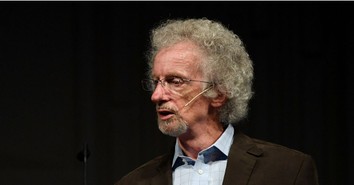Worldview: Which Lens are You Looking Through?

Optical lenses are incredible inventions! Every day, millions of people wake up unable to see clearly the world around them until they pick up their glasses or put in their contacts. What was blurry and distant suddenly becomes clear and near through the lenses that have been prescribed for them. It's hard to imagine a world without lenses. With lenses installed in a frame that sits on our nose or placed directly on our eye, everything we view is brought into focus with these wonderful aids.
There is another lens, however, that is even more important. It's our worldview. Each of us has adopted one—whether we realize it or not. Principles and precepts shape the way we view the world around us. Those principles are imprinted upon us through what we have learned, heard and experienced. Once a worldview is established we interpret everything around us dependent on what has shaped on our lenses. Unlike optical lenses, however, our worldview impacts not only what we see but also what we hear and experience. Everything that enters our mind for consideration enters through the lens of our worldview and we will respond accordingly.
A clash of worldviews is not a new phenomenon. There has always been a contradiction between a worldview established on biblical truth and the worldview espoused by the secular world. Adam and Eve were created wearing the lens of God's clear truth. Their view of the world around them was clearly God-centered as they were created for His pleasure and purposes. The serpent slyly removed the lens that God had given to them and convinced Eve to replace it with a worldview of self-centeredness which obviously led to self destruction. That's old news.
What's new is what is happening in evangelical Christianity. The slippery serpent is subtly changing the lenses of millions of Christians. A biblical worldview that has characterized evangelicalism is being substituted by a distinctly secular worldview. As a result, there is a major shift in how evangelical Christians perceive social and moral issues, current events, church growth and, of course, politics.
A biblical worldview begins with creation as wonderfully revealed in the first two chapters of Genesis. It's not surprising then, that many evangelicals are now questioning the "literalness" of these events and have embraced some form of evolution. The next foundation of a biblical worldview is the fall of man and the subsequent desperate need for redemption. One who has scriptural truth written on their worldview lens understands that we live in a fallen world—a beautiful creation that nonetheless bears the unmistakable marks of the curse. Man is sinful, scripture teaches, and man will do evil things unless he is restrained by law and redeemed by the blood of Jesus. The lens of scripture reveals that the most desperate need of man is not a better environment, a little bit of encouragement or a new government program. A biblical worldview reveals that poverty is an effect, not a cause. Sin is the source of all man's problems and the only true answer is Jesus Christ.
A secular worldview begins with the goodness of man rather than a sovereign God who is worthy of all our praise. It espouses that man is inherently good and just needs some encouraging words and an opportunity to prove his goodness. With this lens—if the Gospel is esteemed at all—it is distorted from the message that Christ died for the sins of mankind to a "positive" message that Jesus came to earth to make good men better or simply to provide for them a positive moral example.
The secularist worldview sees a divine imperative to save the planet but ignores the souls of lost men and women. This deficient and false lens encourages Christians and others to diminish the issues of the unborn and the God-ordained institution of marriage and stresses instead the needs of the poor and the environment. Through this lens a giant redwood has more importance and legal protections than a tiny baby in the womb. Ultimately, the creation is worshipped more than the creator (Romans 1:25). Those looking through this lens have become more concerned about "creation care" than those "fearfully and wonderfully made".
When looking through the lens of a secular worldview "social justice" becomes the end-all answer to all of man's ills. Political activity and government programs take the place of spiritual transformation. After all, the only thing people need is a little bit of encouragement and a hand out to fan that "spark of divinity" into a flame.
Sadly, the same secular worldview that destroyed mainline Christian denominations has now infiltrated evangelical Christianity. A "positive Gospel" that denies the horrors of sin and the need for redemption is tickling the ears of millions. Sin is no longer the problem it's simply lack of opportunity. Poverty is the cause instead of the effect. As officer Krupke said in West Side Story—"I'm depraved on account I'm deprived."
The lens we look through will determine how we perceive all that we see. If the prescription isn't correct, nothing will be clearly in focus. Evangelical Christianity needs to take a trip to the divine optometrist to make sure they are looking through the lens of scripture rather than the lens of this world.
Bob Burney is Salem Communications' award-winning host of "Bob Burney Live," heard weekday afternoons on WRFD-AM 880 in Columbus, Ohio.
Originally published November 14, 2008.







